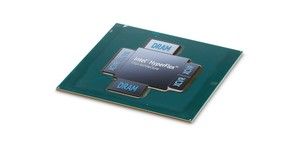Intel has announced a deal that sees it continuing its expansion from first-party chip maker to foundry for third-party fabless companies, winning a contract to build the next generation of field-programmable gate array (FPGA) chips for Altera.
Intel has been farming out spare capacity in some of its older manufacturing facilities to third-party companies for some time, but its freshly-inked deal with Altera is both the largest and the most interesting. Rather than giving Altera access to last-generation process technologies as it moves its own production to smaller nodes, Intel is providing access to its crown jewels: tri-gate transistor technology on a 14nm process.
Field-programmable gate arrays are a special type of semiconductor which, as the name suggests, feature a wealth of logic gates that can be shuffled and reconnected in new ways on the fly. The chips sit between application-specific integrated circuits (ASICs) and general-purpose processors, offering a means of producing a semi-custom chip with much greater efficiency for a given task than a general-purpose processor without the cost associated with a dedicated ASIC - and with the added bonus that the chip's design can be updated at will, or even scrapped and replaced with a new design when the task is done without the need to buy new hardware.
Altera is one of the biggest FPGA makers in the world, jostling for the number-one position with rival Xilinx. Its products are frequently found in networking hardware, where the performance for specific tasks and flexibility compared to ASICs can be well exploited, and in more esoteric projects like the C-One reconfigurable computer originally designed by hardware hacker and Altera FPGA enthusiast Jeri Ellsworth. The chips are also seeing increased take-up among BitCoin miners, who configure them to blaze through the complex computations required to 'generate' the virtual currency.
The deal with Intel will see Altera gain a significant advantage over its rivals in the FPGA market: a move to 14nm is an obvious choice for next-generation parts, but access to Intel's patented tri-gate transistor technology - a modification to the traditional planar layout of transistors which, Intel claims, can significantly boost performance or reduce power consumption - will likely make a major difference in the coming product generation.
'Altera's FPGAs using Intel 14nm technology will enable customers to design with the most advanced, highest-performing FPGAs in the industry,' crowed John Daane, president, CEO and chairman of Altera, of the deal. 'In addition, Altera gains a tremendous competitive advantage at the high end in that we are the only major FPGA company with access to this [tri-gate transistor] technology.'
Intel, for its part, gains a big-spending customer and a way to increase the utilisation - and therefore efficiency - of its fabrication facilities. It's a direction Intel has been leaning in for some time, and one which is the direct opposite of its long-time rival AMD which chose to spin off its foundry business in 2008 as The Foundry Company, later renaming it to GlobalFoundries before severing its final rights to ownership in 2012.
Intel has been farming out spare capacity in some of its older manufacturing facilities to third-party companies for some time, but its freshly-inked deal with Altera is both the largest and the most interesting. Rather than giving Altera access to last-generation process technologies as it moves its own production to smaller nodes, Intel is providing access to its crown jewels: tri-gate transistor technology on a 14nm process.
Field-programmable gate arrays are a special type of semiconductor which, as the name suggests, feature a wealth of logic gates that can be shuffled and reconnected in new ways on the fly. The chips sit between application-specific integrated circuits (ASICs) and general-purpose processors, offering a means of producing a semi-custom chip with much greater efficiency for a given task than a general-purpose processor without the cost associated with a dedicated ASIC - and with the added bonus that the chip's design can be updated at will, or even scrapped and replaced with a new design when the task is done without the need to buy new hardware.
Altera is one of the biggest FPGA makers in the world, jostling for the number-one position with rival Xilinx. Its products are frequently found in networking hardware, where the performance for specific tasks and flexibility compared to ASICs can be well exploited, and in more esoteric projects like the C-One reconfigurable computer originally designed by hardware hacker and Altera FPGA enthusiast Jeri Ellsworth. The chips are also seeing increased take-up among BitCoin miners, who configure them to blaze through the complex computations required to 'generate' the virtual currency.
The deal with Intel will see Altera gain a significant advantage over its rivals in the FPGA market: a move to 14nm is an obvious choice for next-generation parts, but access to Intel's patented tri-gate transistor technology - a modification to the traditional planar layout of transistors which, Intel claims, can significantly boost performance or reduce power consumption - will likely make a major difference in the coming product generation.
'Altera's FPGAs using Intel 14nm technology will enable customers to design with the most advanced, highest-performing FPGAs in the industry,' crowed John Daane, president, CEO and chairman of Altera, of the deal. 'In addition, Altera gains a tremendous competitive advantage at the high end in that we are the only major FPGA company with access to this [tri-gate transistor] technology.'
Intel, for its part, gains a big-spending customer and a way to increase the utilisation - and therefore efficiency - of its fabrication facilities. It's a direction Intel has been leaning in for some time, and one which is the direct opposite of its long-time rival AMD which chose to spin off its foundry business in 2008 as The Foundry Company, later renaming it to GlobalFoundries before severing its final rights to ownership in 2012.

MSI MPG Velox 100R Chassis Review
October 14 2021 | 15:04









Want to comment? Please log in.